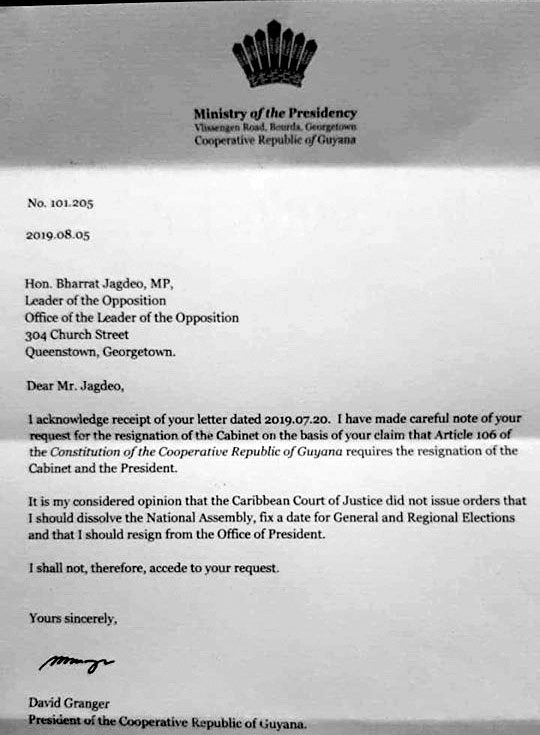President David Granger and his APNU+AFC Cabinet are following the directions of Attorney General Basil Williams and will not be resigning, Director General of the Ministry of the Presidency Joseph Harmon said yesterday.
In a letter dated August 5th, Granger also informed Opposition Leader Bharrat Jagdeo that he will not be resigning. “It is my considered opinion that the Caribbean Court of Justice did not issue orders that I should dissolve the National Assembly, fix a date for General and Regional Elections and that I should resign from the Office of President,” Granger said in his letter. “I shall not, therefore, accede to your request,” he added.
On July 20th, more than a month after the CCJ upheld the motion of no-confidence against the APNU+AFC government, Jagdeo wrote to Granger, requesting that he and his Cabinet resign forthwith in accordance with the CCJ June 18th decision and its July 12th consequential orders. In its consequential orders of July 12th, the CCJ said that the provisions of the Constitution mandating general elections in 90 days from June 18th, were in effect.
In the letter, released to the press, Jagdeo also urged the president to issue a proclamation dissolving the 11th Parliament and fixing a date for regional and general elections not beyond September 18th, 2019.
Yesterday, Harmon reiterated the government’s position. “The attorney general, who is government’s legal advisor… has provided his advice, and the president has responded to the leader of the opposition. In general terms, what the information is, is that the president has advised the leader of the opposition that he nor his Cabinet is resigning and that the Constitution provides for the president and government to remain in office until such time that a new government and president is sworn in,” Harmon told a press briefing at the Ministry of the Presidency.
He said that the president acted on Williams’ advice as he had “requested that advice.”
Both Granger and Williams have declined to make public the advice proffered.
On Friday, Williams told this newspaper that he had completed his examination and advised the president accordingly. “I have given the president the advice. He will address you when he is ready. I can’t preempt the president,” Williams said.
Jagdeo has said that he believes that Granger should seek independent advice as he had no confidence that Williams would state what is constitutionally required.
Williams has also declared to the High Court that the CCJ ruling on the no-confidence motion does not require Cabinet, including the president, to resign as is stated in the Constitution.
In an affidavit filed by Deputy Solicitor-General Deborah Kumar on behalf of Williams in the challenge brought by Christopher Ram against the ongoing house-to-house registration exercise, it is argued that “the Court has never expressly or by implication ordered the Cabinet or the President to resign.”
Article 106 (6) of the Constitution says Cabinet, including the President, shall resign if the government is defeated by the vote of a majority of all the elected members of the National Assembly on a vote of confidence.
Meanwhile, Article 106 (7) adds, “Notwithstanding its defeat, the Government shall remain in office and shall hold an election within three months, or such longer period as the National Assembly shall by resolution supported by not less than two-thirds of the votes of all the elected members of the National Assembly determine, and shall resign after the President takes the oath of office following the elections.”
President Granger had repeatedly stated that he accepts his government’s interim status and respects the decision of the CCJ but has maintained that Cabinet is still functioning, without explaining the inconsistency of that position with Article 106(6). Further, the president maintains that only the Guyana Elections Commission can set the date of elections.
Critics have said Article 106(6) automatically triggers the resignation of the Cabinet, which is defined by the Constitution as comprising the President, Prime Minister, Vice Presidents and Ministers, upon the passage of a no confidence vote, and that by not resigning, the president and Cabinet are violating the Constitution.
Commenting yesterday on Granger’s letter to Jagdeo, former Attorney General Anil Nandlall said that no one had requested the President to resign from Government.
“The request was for the Cabinet to resign including the President (meaning that the entire Cabinet inclusive of its Chairman, the President must resign); that the President issue a Proclamation dissolving Parliament and fixing a date for elections in accordance with the CCJ Consequential Orders and Articles 106(6) & (7) of the Constitution”, Nandlall said.
He noted that the CCJ ruled that Articles 106(6) & (7) were immediately triggered when the No-Confidence Motion was passed on 21st December, 2018 and must be obeyed.
Nandlall charged that not since the PNC rigged the 1985 elections, has the English-Speaking Commonwealth Caribbean witnessed such “violent assault on democracy and such vulgar defiance of a national Constitution and the ruling of a Court of competent jurisdiction, moreover an apex Court, as we do now”.





